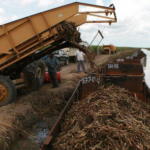The Ministry of Agriculture on Friday commenced its regional extension training programme with the aim of strengthening its extension services.
The first of the many planned sessions took place in the boardroom of the ministry’s Regent Street office and saw attendance from extension coordinators and officers from all ten administrative regions.
Just after assuming office, Agriculture Minister, Zulfikar Mustapha expressed concern with the response of the extension arm of the ministry and noted that urgent changes were needed to ensure effective and meaningful services were being offered to farmers across the country. This, he said, was paramount to the successful development of the sector as Guyana has a leading role to play in the region’s food security efforts.
During Friday’s opening session, Minister Mustapha said it was critical for extension officers to be given up-to-date knowledge related to the sector and be more all-rounded to be able to offer the necessary services and advice to further develop the agriculture sector. He further stated that agencies need to adopt a collaborative effort to avoid duplication of reports, as the government moves ahead with developing an agriculture database to guide policy decisions to advance the sector.
The minister explained that with Guyana playing the leading role in driving the CARICOM food security agenda, the local agriculture sector has to be made resilient. This, he added, starts with delivering strong extension service to all categories of farmers and agro-processors.
“Our current agricultural development programme is being driven by Vision 25 by 2025. If CARICOM has to achieve this, Guyana has to play that leading role. While we are doing this, we want to increase the income of our farmers, create jobs, especially for young people, and improve the economic status of everyone in the country. It is also the government’s intention to have new people in the sector. In order to achieve this, we have to make agriculture more attractive, modern, and less labour intensive so that the younger generation can buy into it,” he indicated.
Minister Mustapha said the aim of the training is to ensure extension staff are equipped with the requisite knowledge to handle all agriculture-related issues that may arise. Noting that the current system has not been yielding the desired results. The minister noted that the new structure will be more central thus allowing for closer collaboration between extension staff from the various agencies.
“We’ve seen a lack of leadership in our extension services. This is why we are here today to have the first of many sessions so that our extension officers can benefit from the training needed. You will be given the requisite knowledge and be kept up-to-date on new strategies and technology in the sector. The current structure in place is not effective. The new structure will be more central. We’ve seen what happened when we had activities to distribute flood relief and the problems we encountered. If we had a comprehensive register most of those issues could’ve been avoided,” he added.
Director General of the Ministry, Madanlall Ramraj pointed out that there was a notable gap between the research conducted and what is disseminated to farmers and that the new structure would address those shortcomings.
“Over the years through the Ministry of Agriculture, we’ve seen extension services provided, at different trajectories in different agencies. A particular agency may have moved forward in terms of the services that are being provided, disseminated from the research aspect, and communicated to the farmers. It is important for the shortfalls and difficulties that have been plagued through the extension services to be addressed. There is a gap between our research and what is being disseminated to our farmers. For us to achieve the agricultural goal, we’ll have to address that,” Mr. Ramraj noted.
He disclosed that upon completion of the training exercises, a more robust data management and monitoring and evaluating system will be in place to ensure the structure being developed produces the desired results.
Over the next few months, extension staff from across the region will attend several training exercises focused on a number of topics which include farmers’ database and record keeping, agriculture information software systems, extension methods and strategies, and planning and implementation of extension activities.








